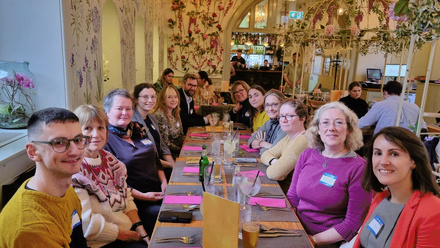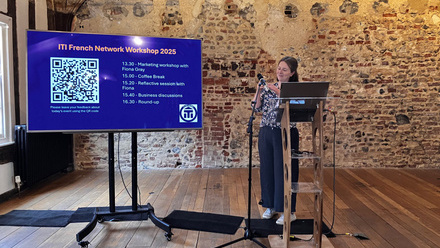Kickstarting your career as a freelance translator
Andrew Bell was the winner of the ITI Award 2022 for Best Newcomer - Freelancing. Here, he shares how he successfully launched his career in the middle of the pandemic.
Kickstarting your career as a freelance translator is never easy, even less so when you’re in the middle of a global pandemic. This is exactly the situation I found myself in, in the autumn of 2020. Having recently submitted my extended translation project as part of my MA in applied translation studies, I was ready to start working. The plan had always been to find a job in-house to build up my experience, but COVID-19’s effect on the job market quickly put an end to that idea. Not wanting to waste any time, I decided that going freelance was my best bet.
The first hurdle I came across was how could I find work when I had no professional experience or contacts? The answer was actually quite simple: by networking and marketing myself. But as a recent graduate, you probably wouldn’t be surprised to hear that the thought of that absolutely terrified me.
Networking doesn't need to be scary
The main problem I had with networking was that I had so many misconceptions about it. What I soon found out was that networking doesn’t have to be a formal activity, and the end goal doesn’t have to be finding new clients. What I’m trying to say is that there is not one right way to network, and it completely depends on what you want to get out of it. So, what did I do?
ITI regional networks
I decided the best use of my time would be to network with colleagues and soak up all of their advice and collective experience. I did my MA at the University of Leeds, so I’d already joined the Yorkshire Translators and Interpreters (YTI), but having returned to my hometown in Cumbria during the pandemic, I decided to join the local North-West Translator’s Network (NWTN) as well. I tweeted about joining and within the hour I’d been invited to their next weekly working lunch held on Zoom.
Each working lunch session had its own theme related to freelancing or translation and interpreting. It was a terrific way to soak up from experienced colleagues all the knowledge you can only get from working on the job. To be honest, I felt like I didn’t have much to contribute to these discussions as I was a newcomer, but everyone was very encouraging and I soon realised that I had just as much to contribute, I was just approaching everything from a different perspective. By the time I came to quote on my first paid job, I knew exactly what I needed to do, what I needed to clarify before starting, and perhaps most importantly, that my rates were reasonable.
Marketing activities
How do you market yourself if you have no experience? People just want to see your testimonials, right? From networking with colleagues, I realised that I needed to market what I could bring to the table and stop focusing on what I couldn’t.
Blog
I thought starting a blog would be a clever way of demonstrating my enthusiasm for my new career, as well as showing potential clients that whilst I didn’t have much experience, I was familiar with the translation process.
At first, it can be a little disheartening as imposter syndrome kicks in and you wonder whether anyone cares what this newcomer with no experience has to say, but that’s not the case. I knew from networking that I was quite knowledgeable when it came to CAT tools (that’s one of the ways the MA came in handy), so that was the topic of my first blog.
I addressed a lot of different topics in my first year, and as I published them, I was able to start discussions with new colleagues through social media and continue to grow my network. Quite recently in April 2022, the American Translators Association got in touch with me to say they wanted to republish a post I’d written a year earlier on bilingual review files in their ATA Business Practices Next Level blog. Since then, my network has expanded to include a lot of US-based translators, so I’m excited to see where this takes me.
Social media
I used my blog to help expand my network on social media and being active on social media is an excellent way to get your name out there and meet new colleagues, especially in my case since I live far away from everything and everyone in Cumbria.
All translators should at least have a LinkedIn account, but there is also a huge translation community on Twitter, and Instagram isn’t far behind. If you connect with the right people, your feed will be full of excellent CPD recommendations, interesting business hacks, and even the occasional translation meme. Having this strong network of colleagues could even result in referrals in the long run (one of my most interesting jobs to date was a referral from a colleague I met on Twitter).
Everyone’s freelance journey is different, but hopefully you’ve found hearing my experience useful!






